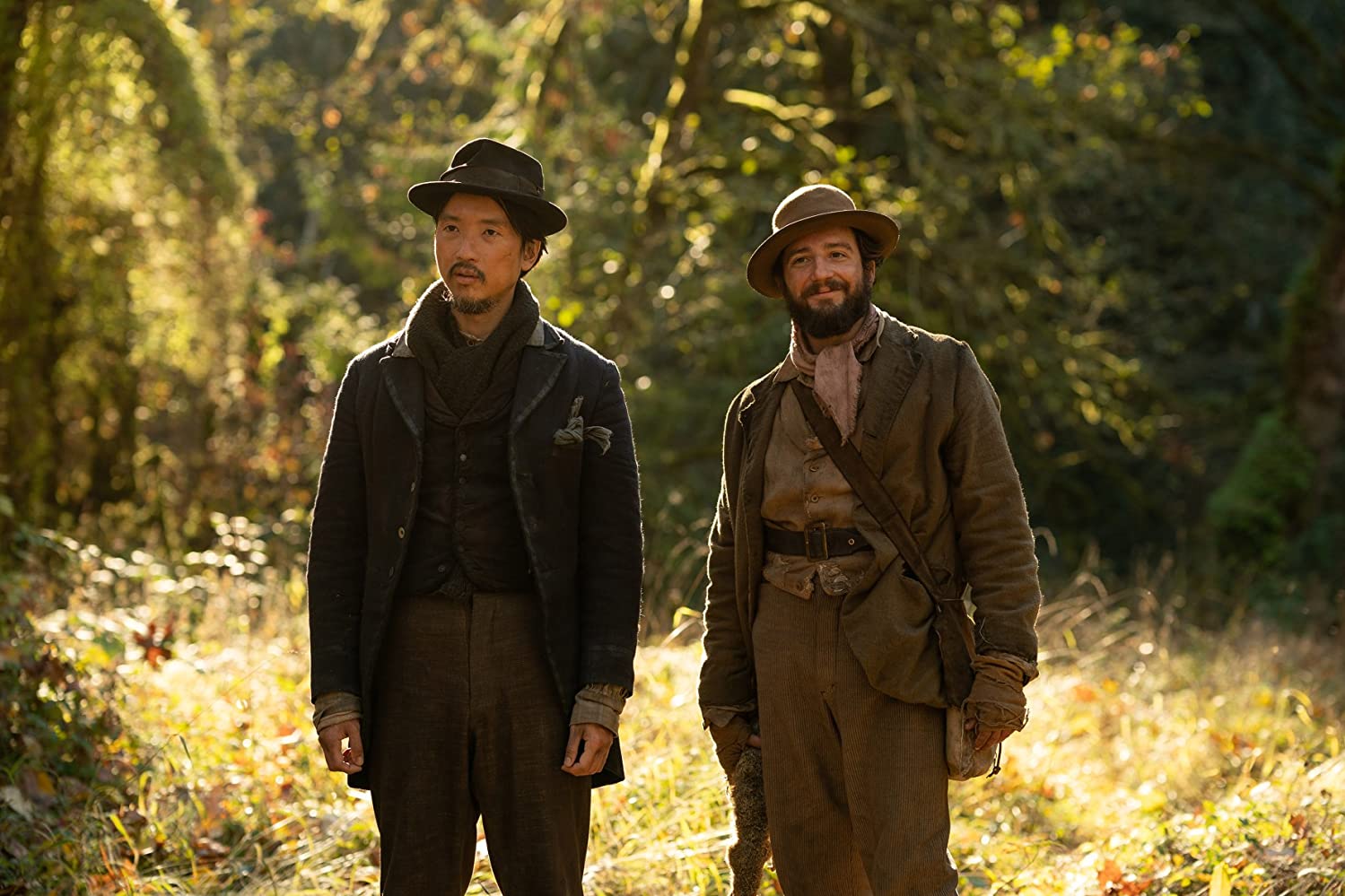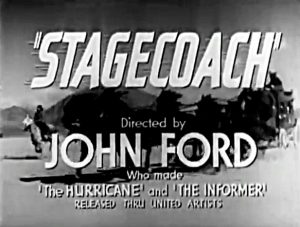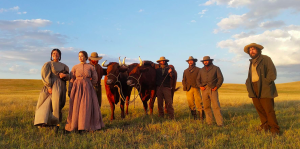First Cow opens with a huge, rusty barge floating down the Columbia River at a glacial pace. Between the vessel’s entrance from the left of the screen and eventual exit to the right, the audience settles into the slowness of First Cow, becoming absorbed into its hypnotizing, soothing atmosphere. At the same time, the scene is deceiving—it sets the place, but not the time of the film. This river is the same 19th-century Chinook Indian trade highway where the film’s main story takes place but in a more contemporary era. This prologue is really an epilogue. In the scene, a wanderer in the woods next to the river stumbles upon two sets of human remains, huddled next to each other in the ground. There’s a story attached to this place, but it’s already come to pass.
“It’s a story showing America for what it is,” director Kelly Reichardt said in an interview with the Voice. “[First Cow is] dealing with the American myth of ‘you need a good idea and some gumption and you can just make your way.’ From having nothing to being anywhere you want to be.” This story—slow, small in its scope, and specific in setting—transports us back to the origins of that myth.
On a much smaller craft, a few centuries earlier, the first cow ferried into the territory (played by the bovine “actress” Evie) drifts down the Columbia—a harbinger of what was to come to the then-untamed Oregon wilderness. Soon man-made industry and capital would take over, steamrolling the order of the natural world. But for the moment, everything is still unnamed, in flux. “History isn’t here yet,” says King Lu (Orion Lee), an enterprising Chinese immigrant. “It’s coming, but we got here early this time.”
While foraging for mushrooms, ‘Cookie’ Figowitz (John Magaro), a cook for a westward-bound band of beaver trappers, stumbles upon a naked and shivering King Lu, on the run from hostile Russians. The two form a close bond, living outside a bustling trade outpost and exchanging their hopes and aspirations. Cookie dreams of opening a hotel in San Francisco, where he’ll be able to put his culinary talents to use. The pair begin to steal milk from the novel dairy cow belonging to the wealthy landowning Chief Factor (Toby Jones), taking to baking oily cakes and selling them to passer-throughs at the nearby settlement.
First Cow isn’t interested in the grandiosity typical to the Western genre. Reichardt paints early America with a delicate brush, but unlike the landscapes of stretching prairies and deserts she cites as aesthetic references, First Cow was shot in the tight, boxy 4:3. The humble frame doesn’t attempt to capture the sublimity of the wild land; rather, the wooded Pacific Northwest feels claustrophobic, finite.
“It’s not the big expanse of the west. It’s an intimate story, in the west,” Reichardt said. Within this bounded space, Cookie and King Lu’s story thrives, illustrating in detail a tiny slice of frontier life.
Certain throughlines run between First Cow and the other films in Reichardt’s oeuvre. Certain Women (2016) embodies that same Western flair, Old Joy (2005) likewise makes use of the Oregon wilderness, and Meek’s Cutoff (2010) combines both aspects. Reichardt’s films differ from the conventional gunslinging, saloon-drinking Western, glorifying the lost American past, primarily because of their subjects. “Westerns are usually told from the point of view of the people who have the power,” she said. “It’s a very white man’s genre.”
Cookie and King Lu—a Jewish man dreaming of hotel-owning and baking, and a Chinese immigrant—are outside the power of Chief Factor’s world, and above the cruelty and brutality of their own immediate surroundings. Cookie especially is unassuming, gentle. His small acts—flipping over a salamander stuck on its back, covering a freezing King Lu with his blanket, apologizing to the cow as he milks her—speak volumes about his character.
Most westerns render violent masculinity, conquering and triumphing over the rough-and-tumble world, not only necessary but heroic. Reichardt takes issue with that concept. “Hopefully, the hero aspect people love in an American tale is not with the strong man, but with someone who’s living a more vulnerable, complicated, emotional life. That’s really where the strength is.”
Being first to the frontier is a lonely endeavor—a truth reflected in the titular cow’s big, sad eyes—which is why the relationship between the two men is the film’s true core: “The bird a nest, the spider a web, man friendship,” reads the epigraph opening the film. Cookie and King Lu forge a shared sense of home out of their previously nomadic lifestyle: homemaking, baking oily cakes and blueberry clafoutis, and musing about the future in their forest shanty. According to Reichardt, they’re just two travelers looking to live a settled life. “The trappers around them—every time they talk they end up in a brawl. And so, they’re just trying to live on the outskirts of all of that,” she said. “Part of what draws them together, I think, is that they both don’t function well in that world where any moment things will come to blows.”
Reichardt’s meticulous research, which production designer Anthony Gasparro brings to life, is evident in every inch of every frame. The film is deeply invested in the minutiae of 19th-century life, from dialogue in the preserved Chinook Wawa jargon to Cookie and King Lu’s domestic activities, splitting wood and sock darning. What results is a richly textured, lived-in world. Whether or not First Cow becomes bogged down in its details is really a question of the viewer’s patience—for me, the film never dragged, but I found myself spaced-out and spellbound by First Cow’s aura, rather than engaged in its plot. There isn’t much to this story, as Reichardt is more interested in the exploration of her characters and their specific historical environment. “The frame helps [First Cow] to not take on that grandeur of the American West. It’s more like this moment, with these people, in this place.”
And maybe it’s this interest in history that explains the disinterest in mythos—First Cow looks honestly at the fabled narratives of American pioneering, even if its characters sometimes take a more romantic perspective. King Lu’s prophecy, that “history” is on the near horizon, comes to pass. Yet the opening—half prologue, half epilogue—creates a conversation between past and present reflective of what that history means. And “reflective” is perhaps the best word to describe the film, each scene providing ample breathing room for the viewer to get lost in time. With First Cow, Reichardt asks us to do both: immerse yourself in the fine details, but always keep one eye on what’s to come.





